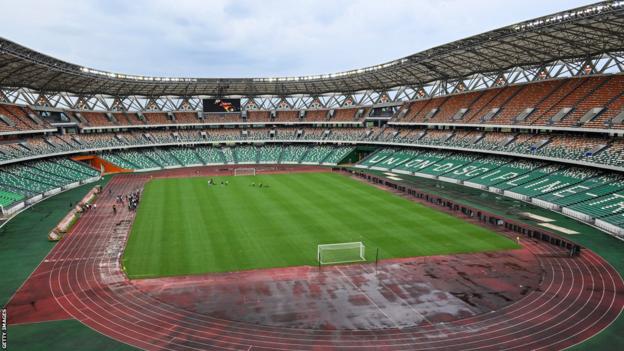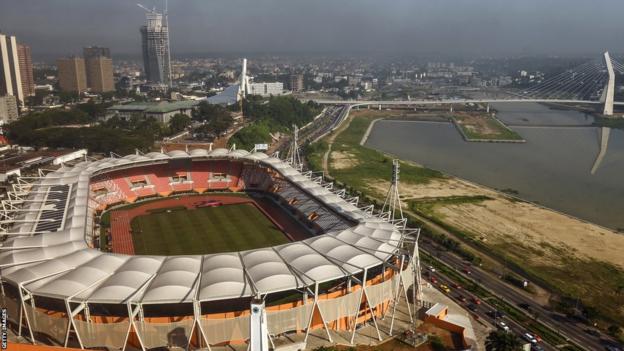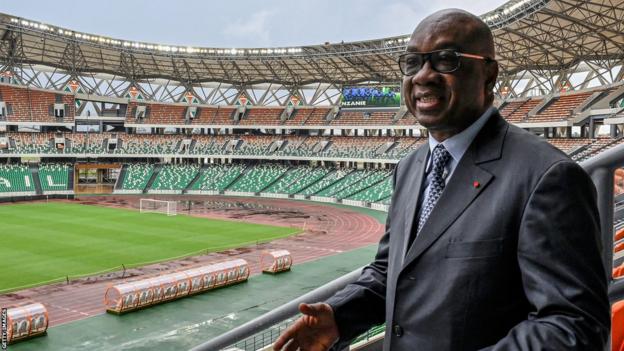This website uses cookies so that we can provide you with the best user experience possible. Cookie information is stored in your browser and performs functions such as recognising you when you return to our website and helping our team to understand which sections of the website you find most interesting and useful.

Ivory Coast international Ghislain Konan says it is an "enormous pride" for his country to host the 2023 Africa Cup of Nations and believes that visitors will receive the warmest of welcomes next month.
The tournament kicks off on 13 January, with the opening game and the final on 11 February taking place in the country's financial hub Abidjan.
"I can tell you that it will go very well," Konan, who plays his club football in Saudi Arabia, told BBC Sport Africa.
"We are a country of hospitality and one that welcomes others. As we like to say back home, we like foreigners more than we like ourselves.
"We will truly welcome the visitors who'll come to our home and also show them that we are a great country."
Konan, who was born in Abidjan, was speaking a few days after the Ivorian government said it will be using some of its 20,000 volunteers to help fill stadiums during Nations Cup matches.
The tournament, which was moved from June-July of this year to January 2024 to avoid Ivory Coast's rainy season, will be staged in five different cities.
Abidjan is the only city that will use two stadiums - with the newly-built Alassane Ouattara Olympic Stadium hosting the opening match and final - while Bouake, San Pedro, Korhogo and the capital Yamoussoukro will also host games.
The stadiums in the latter three cities all have a capacity of 20,000, with Abidjan's Felix Houphouet-Boigny Stadium and the Bouake arena able to accommodate 40,000 and the Alassane Ouattara 60,000.
Yet the 23 teams trying to ensure the trophy leaves Ivory Coast, including defending champions Senegal, may find more support from the locals than they expected.
"Among the 20,000 volunteers we have, it is expected that a portion will support non-Ivorian teams - which is a first," Toure Nimba, a sports ministry official, claimed on Friday.
"Every time a non-Ivorian team plays in the competition, you will have Ivorians supporting those teams. The organising committee is also arranging that school children will move en masse to stadiums during matches.
"We have local committees reaching out to the smallest hamlets, and it is the combination of all these efforts that will allow us to have full stadiums."
In the past, poor attendances have been a feature of many Nations Cup matches which do not feature the host country.
However, Cameroon, which hosted the 2021 edition, bucked that trend and organisers hope Ivory Coast can do similarly.
Delay 'served Ivory Coast well'

Ivory Coast was originally going to host the Nations Cup in 2021, only for the Confederation of African Football (Caf) to reallocate the staging of that tournament to Cameroon, which had been set to host the 2019 finals.
Despite filing a protest with sport's highest legal body, the Court of Arbitration for Sport, about the change in December 2018, the Ivorian government agreed to the enforced switch just a month later after a meeting between President Ouattara and then Caf president Ahmad.
With the six stadiums and 24 training grounds ready, not to mention corresponding works on upgrading Ivory Coast's transport, hotel and medical facilities, organisers feel the delay may have ultimately worked in their favour.
"Today, I can see we profited a little bit from the delay, even though I think we would have been ready for 2021 if we had had to be," said Nimba.
"But I still take it as divine grace that we are here today, with infrastructure which has been finished far better thanks to all the tests we have done.
"We had time to test them technically, and in terms of both crowd control and security, so that we are ready."
With the then Ivorian sports minister having declared the country "99%" ready as far back as July, Ivory Coast has had the rare luxury of plenty of preparation time to stress-test facilities.
Stadiums already in use

The various stadiums have all hosted several matches, with Korhogo and San Pedro even staging this year's Women's African Champions League last month.
One of the biggest setbacks Ivory Coast suffered in its preparations came in September when the national side's friendly against Mali at the Alassane Ouattara Olympic Stadium, now Ivory Coast's biggest arena, had to be abandoned after 45 minutes when heavy rain made the pitch unplayable.
This was later described by Caf as "a maintenance problem rather than a drainage one", with the stadium hosting a 2026 World Cup qualifier (the 9-0 thumping of Seychelles) last month without problems.
Following the widespread improvements across a country which suffered debilitating civil wars between 2002 and 2011 - conflicts which led to the displacement of over one million people in addition to the destruction of infrastructure - Ivorian officials are confident the country is on track to host the "best Nations Cup ever".
"On 13 January, Ivory Coast - before all the cameras of the world - will deliver an unforgettable spectacle," said Francois Albert Amichia, who heads up the local organising committee.
"Then it will be up to the 24 teams to shine on the field and show that the positive development we saw at the World Cup in Qatar from Africa's representatives was not a flash in the pan but a reality - because African football is evolving."
Having last hosted the Nations Cup in 1984, Ivory Coast will be looking to win the title for the first time on home soil, after triumphing in Senegal in 1992 and then in Equatorial Guinea in 2015.
"We are coming to win it but it won't be easy since there are many big nations," said Konan, a left back who has won 31 caps since his debut for the Elephants in 2017.
"But given we are playing at home, we will try to give everything to ensure the beautiful trophy stays in the country."
Additional reporting by Noel Ebrin Brou in Ivory Coast.



 Africana55 Radio
Africana55 Radio 
